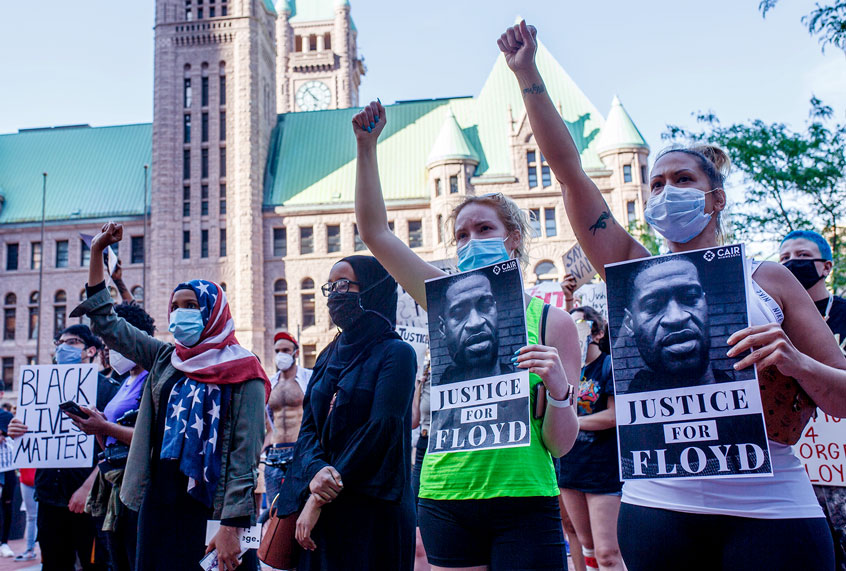Former Minnesota police officer Derek Chauvin has been found guilty on three counts of murder and one count of manslaughter in the May 25, 2020 death of George Floyd, a 46-year-old Black man who was handcuffed by police on suspicion of passing a counterfeit $20 bill. Chauvin then proceeded to pin Floyd onto the pavement, with his knee on Floyd’s neck, for a full 9 minutes and 29 seconds.
Floyd’s death, caught on tape as he repeated the words “I can’t breathe” 27 times in the first four minutes and 45 seconds of the incident, caused protests to erupt across the world last summer. Chauvin had faced three charges: second-degree murder, third-degree murder and second-degree manslaughter. Chauvin is now heading to jail for the first time since his initial arrest.
The three guilty verdicts were found after about 10 hours of jury deliberations. Both President Joe Biden and Minnesota’s Democratic Gov. Tim Walz are expected to address the verdict Tuesday evening. “This verdict will not heal a nation,” Vice President Kamala Harris said ahead of the verdict.
During a trial that lasted for nearly three weeks and included 45 witnesses called to the stand, lead prosecutor Steve Schleicher argued that Chauvin “chose pride over policing.” Floyd’s death, he said, was “unnecessary, gratuitous and disproportionate.”
“The only thing about [the] defendant’s intent that we have to prove is that he applied force to George Floyd on purpose,” Schleicher explained. “Somebody’s telling you they can’t breathe, and you keep doing it. You’re doing it on purpose. … How can you justify the continued force on this man when he has no pulse.”
Chief Medaria Arradondo of the Minneapolis Police Department, who was called to the stand by the prosecution, alleged that Chauvin “absolutely” violated the department’s police procedure during Floyd’s arrest.
Schleicher also reminded jurors that Floyd is not the man on trial. “He didn’t get a trial when he was alive, and he is not on trial here,” Schleicher said.
Leading defense attorney Eric Nelson, who argued that Chauvin’s use of force was warranted, encouraged the jurors to consider the “totality of the circumstances” around the case and argued that no murder was committed if Chauvin’s use of force was justified. Nelson showed Chauvin’s bodycam footage at the start of his encounter with Floyd and argued that Floyd resisted arrest which escalated the amount of force justified to make the arrest.
“It’s not the proper analysis, because the nine minutes and 29 seconds ignores the previous 16 minutes and 59 seconds,” Nelson said of the prosecution’s case, adding, “A reasonable police officer would, in fact, take into consideration the previous 16 minutes and 59 seconds.”
Chauvin’s defense attorney also alleged that the findings of the prosecution’s medical examiners “flies in the absolute face of reason and common sense.” The attorney pointed out that Floyd’s health had been declining prior to the arrest, which Nelson told jurors must be accounted for, especially since Floyd has fentanyl and methamphetamine in his system during his engagement with Chauvin. The defense did not, however, present their own clinicians to testify. Furthermore, several medical experts on the prosecution’s side refuted Nelson’s argument that Floyd did not die of asphyxia or a lack of oxygen. Medical experts also said that the results of Nelson’s toxicology report were not consistent with an overdose, which Nelson tried to cite as a factor in Floyd’s death.
18-year-old Darnella Frazier, who filmed the violent encounter that caused a nation to erupt, also testified about watching Floyd’s last moments on that Minneapolis street.
“It seemed like he knew it was over for him,” Frazier said of Floyd. “He was terrified.” Frazier said she often finds herself “apologizing to George Floyd for not doing more and not physically interacting and not saving his life.”

